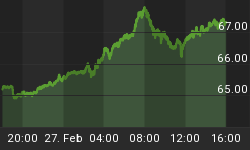Sentiment extremes often foretell major turns in financial markets
I came across this sentence in an article about gold:
Nobody expects gold prices to turn up soon...
Another observer put it this way:
There doesn't seem to be anything on the horizon that will make gold prices go up.
It would be easy to think these comments published last week, when gold's price reached a 4 1/2 year low ($1,131.85).
But in fact, those comments published on February 12, 2001 -- within days of gold's major low of $253. Many investors missed the ten-year bull market in the yellow metal that followed.
The peak of that bull run was Sept. 6, 2011, when gold reached its all-time high of $1921.50. The then-prevailing sentiment was the opposite of 2001. A major global bank announced that gold's "fair value" was $10,000 an ounce.
We had a different point of view. Just four days before gold's top, The Elliott Wave Financial Forecast featured this chart and commentary.

Commodity fifth waves in major rallies often end in a final spike higher. ...
Gold's wave structure is consistent with a terminating rise. As this monthly chart shows, prices exceeded the upper line of the channel formed by the rally from the 1999 low in what Elliott terms a throw-over. A throw-over occurs at the end of a fifth wave and represents a final burst of buying, as the last sub-waves of a rally conclude.
Financial Forecast, September 2011
Sentiment extremes often accompany major trend changes in financial markets. The Daily Sentiment Index (trade-futures.com) showed 98% gold bulls around the time of the yellow metal's all-time high. More than that, a Gallup poll showed that Americans considered gold to be the best long-term investment.
Since then, the price of gold has fallen by over a third.
Now, pessimism is again the prevailing sentiment surrounding gold.
On November 10, an analyst told CNBC: "I don't see a reason why gold prices would continue going up - there are more reasons for prices to go down." The head of precious metals at a Canadian bank says, "The [gold] market still looks vulnerable.'"
On November 7, the largest gold-backed exchange-traded fund saw its biggest one-day outflow in nearly three weeks. October saw its biggest monthly outflow of 2014.
What's next for gold? You may have guessed, the sentiment is again suggesting that the majority opinion (bearish, this time) will be proven wrong.
New Free Resource: The Gold Report -- 2015
New technical analysis, eye-popping sentiment studies, why most analysts missed gold's 2011 top, plus a BIG near-term opportunity developing for gold investors right now. Log in to read the report now »
Don't have a login? Complete your free Club EWI profile to get immediate access to this report >>
This article was syndicated by Elliott Wave International and was originally published under the headline Investors Hated Gold at Precisely the Wrong Time: What About Now?. EWI is the world's largest market forecasting firm. Its staff of full-time analysts led by Chartered Market Technician Robert Prechter provides 24-hour-a-day market analysis to institutional and private investors around the world.















